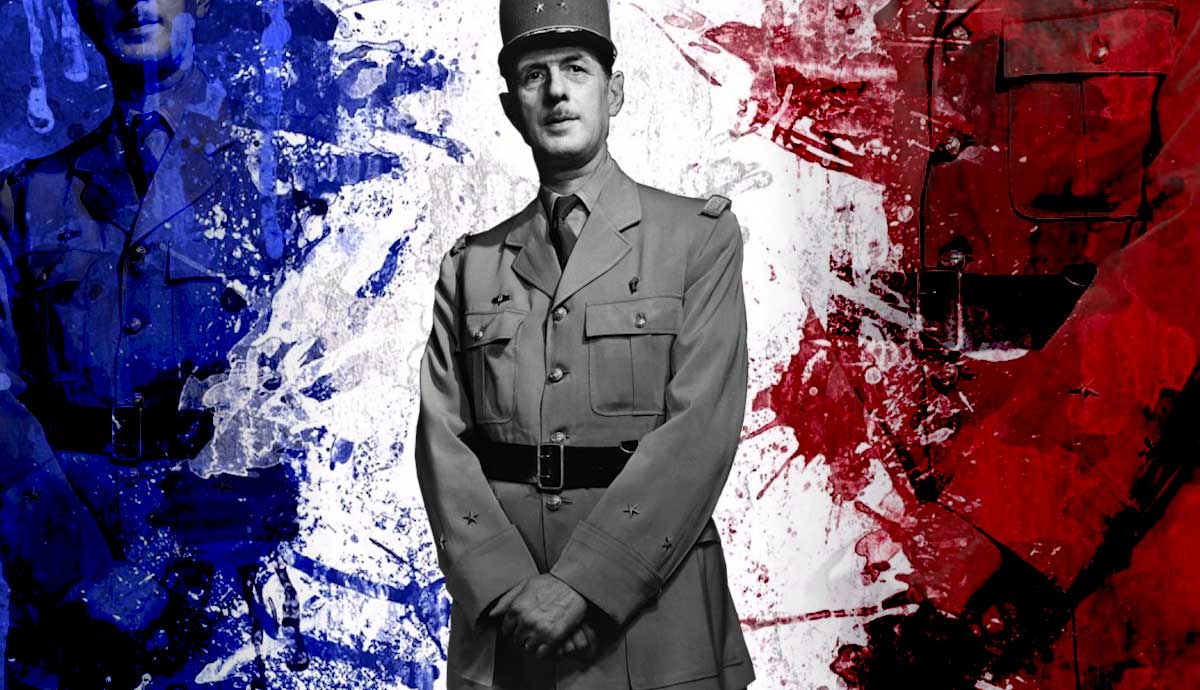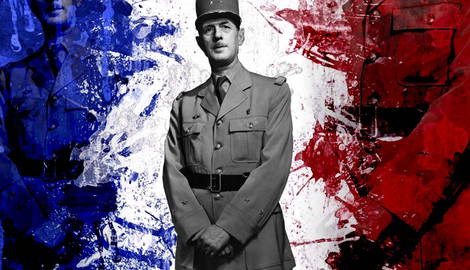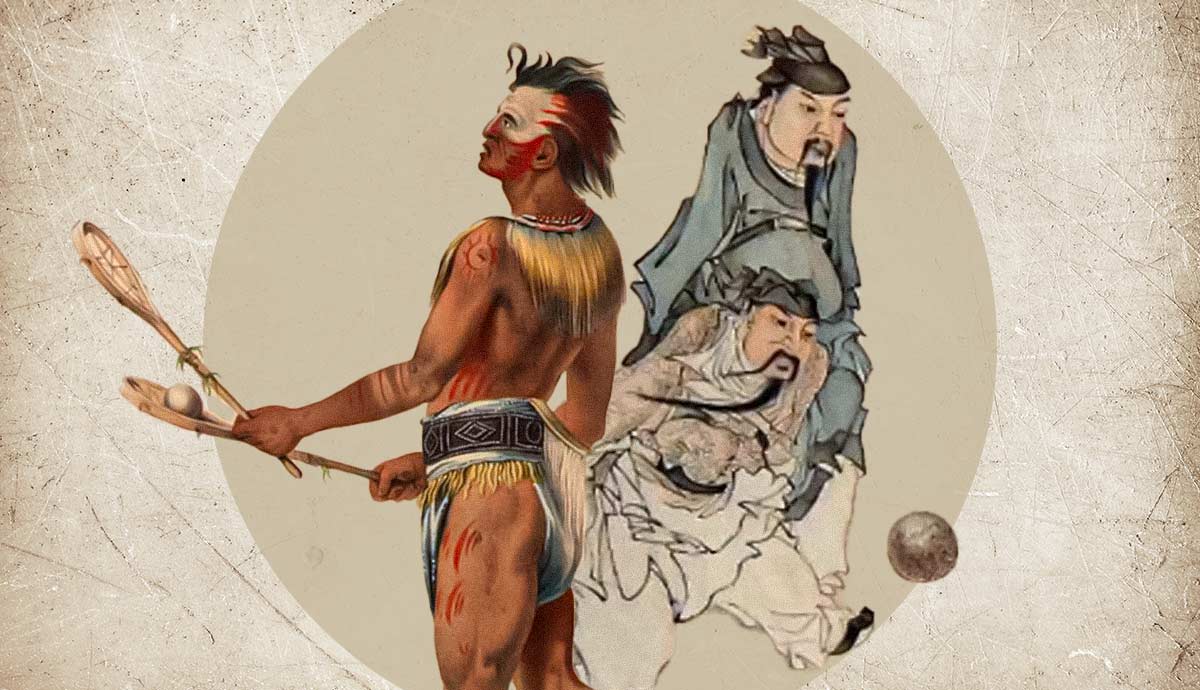
Charles de Gaulle was a French army officer and statesman who first led France against Nazi Germany in World War II and later, from 1944 to 1956, fought to restore democracy as the head of the French provisional government. In 1958, he was appointed as the President and created a new constitution of the Fifth French Republic, which increased the power and influence of the president. De Gaulle was elected as the president again in 1965 and successfully dealt with the civil unrest and crisis in 1968. His political ideology is known as Gaullism. The idea saw France as an independent, strong nation, not subordinate to other nations or organizations.
Influenced by French exceptionalism, de Gaulle intended to exert French influence on the international order. He supported the decolonization process, resolved the Algerian Crises, developed the independent French nuclear capability, and tried to avoid the Cold War era’s polarized balance of power. All these served to guarantee France’s national independence without resorting to allies whose interests might not coincide with those of France.
Charles de Gaulle: The General of France

Charles de Gaulle was born in 1890 in Lille, France, to a traditional Catholic family. Since childhood, he was fascinated by history and philosophy, especially French history and military strategy. Little Charles started writing from a young age. In 1905, at age 15, he wrote an essay in which he led the French army against Germany. Later, de Gaulle recalled that in his youth, he often thought about war with Germany to avenge the defeat of his homeland in the Franco-Prussian War in 1870.
In 1912, he graduated from Saint-Cyr Military College and soon participated in combat operations during World War I. He was wounded and captured by the German military several times but was finally released on November 11, 1918. De Gaulle met the start of World War II as a colonel and later, in 1940, was appointed as an Undersecretary for War. However, on June 15, 1940, he emigrated to Great Britain because he refused to accept his government’s armistice with Germany.
Before the liberation of Paris and France in 1944, Charles de Gaulle was the leader of the government-in-exile, Free France, and the Free France Forces, sponsored by the British government. Nevertheless, de Gaulle was constantly challenging the British Prime Minister, Winston Churchill, to ensure that the interests of the French were considered during World War II negotiations. In his Appeal of 18 June from the BBC studio, de Gaulle called, “Whatever happens, the flame of French resistance must not be extinguished, and it will not be extinguished.”
He criticized the French military leaders who agreed to a cease-fire with Nazi Germany. De Gaulle called all his compatriots to the side of the defenders of Free France and emphasized the importance of the support of the international allies, particularly the United States and Great Britain, for the final victory in World War II.

As a result of these efforts, the French military units entered Paris to liberate the city on August 25, 1944. This operation had a special symbolic impact on General de Gaulle and especially in France as a nation.
After the end of World War II, thanks to the authority and efforts of the General, one of the occupation zones in Germany was handed over to France. In de Gaulle’s view, France could restore its honor only if it were granted one of the occupation zones of Germany. Also, during the creation of the United Nations, France was granted permanent membership of the Security Council and, accordingly, the right of veto. De Gaulle achieved all of this even though the French representatives were not invited to any important conferences to end World War II, neither in Cairo nor in Potsdam or Yalta.
President De Gaulle

In addition to economic problems in post-war France, difficulties related to the loss of colonies, law enforcement, and the rise of communists appeared. To solve them, de Gaulle believed it necessary to create the Fourth Republic and establish a presidential government. However, in 1946, existing political groups rejected his visions and supported a parliamentary republic. Although de Gaulle was elected as the head of the new government the same year, he soon resigned and spent the next 12 years in the shadows, writing his memoirs. This period is often referred to as “the crossing of the desert.” General de Gaulle did not describe these 12 years in his memoirs. He thought the period was not worth recording as he had no power and influence on the local and international events.
In 1958, the need for a strong, charismatic leader was apparent in France, and General de Gaulle was the perfect figure for the role. France’s international position was weakened by the activation of the liberation movement in Algeria, at the time part of France. All of these were accompanied by domestic political instability. To describe France’s internal and international situation, Charles de Gaulle uttered his famous phrase, “How can you govern a country which has 246 varieties of cheese?” Nevertheless, in 1958, de Gaulle was elected president of the French Republic.
Charles de Gaulle’s Foreign & Security Policy

The main characteristic of de Gaulle’s policy was the rise of nationalism, which meant returning glory and power to France. In this context, de Gaulle made extraordinary foreign and security policy decisions, including France’s nuclear politics, NATO membership, and decolonization.
Thanks to de Gaulle’s efforts, France became the fourth nuclear power after the USA, Great Britain, and the Soviet Union. With this move, de Gaulle’s goal was to emphasize the strength of France and gain more independence in the international arena, including from NATO member states. De Gaulle believed that nuclear weapons would balance the United States’ influence in Europe and reduce the constant anxiety of European politicians about American passivity on the European continent. The legacy of de Gaulle’s nuclear policy is that currently, France ranks first in total electricity generation from nuclear power worldwide.
France is one of the founding countries of NATO. However, in de Gaulle’s opinion, the interests of the USA and Great Britain dominated the decision-making in the NATO Security Council. He believed that in the event of an attack by the Soviet Union, the United States would not fulfill its obligations under Article 5, which implied a collective defense system. Accordingly, in 1966, de Gaulle decided to leave the military structures of the alliance (however, he retained the status of a member), and foreign military bases left France’s territory. This move was meant to create a greater French military independence in a Cold War context.

Charles de Gaulle supported the decolonization of France’s African colonies. The catalyst for the decolonization process was the Algerian War for Independence, which started in 1954. This is the period that also saw the decolonization of the North African French colonies Morocco and Tunisia. The Algerian War accumulated political crises in the Fourth Republic of France in 1958 as the government took brutal measures to suppress the uprising. The French public, as well as international allies, including the United States, showed clear dissatisfaction with the conflict.
Charles de Gaulle returned to politics in 1958 as the head of government. The most controversial issue on the agenda was the independence of Algeria. In 1960, several mass demonstrations took place, followed by the United Nations resolution recognizing the Algerian Independence. Charles de Gaulle initiated a series of negotiations that concluded with a referendum in Algeria in 1962. 99,72 % of the population chose complete independence from France.
De Gaulle aimed to position post-World War II France as the self-determination supporter and the decolonization champion. As Charles de Gaulle explained, “It is very good that there are yellow French, black French, brown French. They show that France is open to all races and has a universal vocation.”
Civil Unrest in France, 1968

From March 22 to May 2, 1968, demonstrations of workers and students began in major cities of France. Protest waves were accompanied by violent suppression efforts from the French authorities. Demonstrators united around the problems of a just country, a conservatism of the university system, increased unemployment, and market globalization. Questions bothering the new generation included the American army’s presence in Vietnam in 1968, the limited scope of actions for the universities in France, racial segregation, etc.
The civil unrest that started in Paris quickly spread to other provinces of France. Ten million people rebelled. The metro stopped in Paris. Airports were closed. Ships with red flags appeared on the coast of France, and railway and sea traffic were disrupted. Big cities were in danger of starvation.
Charles de Gaulle’s answer to the protest was simple: yes to reforms, no to chaos. The general appointed snap parliamentary elections. The French preferred peace to revolution, and de Gaulle won once again. However, President de Gaulle’s authority and popularity declined. As a result of the 1969 referendum, de Gaulle resigned as president of France.
Charles de Gaulle & Widowed France

After the events of 1968 and de Gaulle’s resignation, he resumed writing his memoirs. Charles de Gaulle died suddenly in 1970. The new president, Georges Pompidou, announced the death of General to France with the following words, “General de Gaulle is dead. France is a widow.”
Charles de Gaulle saved France several times from a deep crisis. He made a great contribution to the liberation of France from Nazi Germany in World War II, which made him a war and national hero. After World War II, de Gaulle was the leader of France in some of the tensest periods, between 1944-1946 and 1958-1969. The establishment of the most recent Fifth French Republic and the creation of a new constitution is associated with Charles de Gaulle. The constitution strengthened the institution of the presidency, while president de Gaulle made French politics more nationalist and strengthened its position in the international arena.
The influence of Charles de Gaulle’s political views was so great on France that the concept of Gaullism was born. Gaullism preached the complete independence and strength of France and preferred independence from international organizations (the UN, the EU, NATO), superpowers (the United States, the Soviet Union), or financial institutions. All the presidents of the Fifth Republic were and are guided by Gaullist principles. General de Gaulle did not oppose the waves of decolonization and self-determination of nations either, saving France from overseas conflicts.
Charles de Gaulle’s memoirs begin with the words, “All my life, I have formed a certain idea of France.” His successor, Georges Pompidou, announced on the day of the general’s funeral that Charles de Gaulle gave France institutions, independence, and a place in the world.










